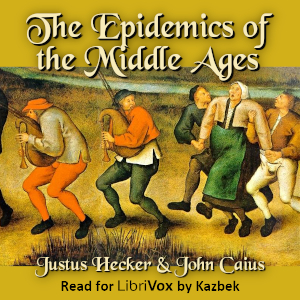Great audiobook "The Epidemics of the Middle Ages - Justus HECKER" online free
Justus Friedrich Carl Hecker (1795-1850) was a German physician and medical writer, whose research focused on the history of epidemics, in a broad sense of the term that included pandemics like the Black Death as well as the group of social phenomena known as dancing mania. The Epidemics of the Middle Ages comprises three of his works -- The Black Death, The Dancing Mania, and The Sweating Sickness -- translated by the English epidemiologist Benjamin Guy Babington. Despite what the name of the book may suggest, the events it describes are not limited to the Middle Ages.
The Black Death recounts the history of the bubonic plague in Europe, with particular attention to its cultural ramifications, such as the Flagellant movement and persecution of the Jews. The Dancing Mania describes mysterious social phenomena that occurred mainly in Europe between the 14th and 17th centuries, in which groups of people engaged in apparently uncontrollable dancing. The nature of the dancing mania continues to be a subject of debate, and Hecker's book remains one of its most comprehensive descriptions. The Sweating Sickness was a series of epidemics that struck England and later continental Europe during the 15th and 16th centuries. Hecker's account pays particular attention to its impact on political history.
Hecker's books were written before the germ theory of disease became widely accepted. While his accounts of epidemics are based on critical examination of historical evidence, modern readers are likely to disagree not only with his epidemiological theories, but also with his assessments of the evidence itself. These disagreements can provide a striking illustration of how the prevailing views of one's time may affect one's judgements about credibility of primary sources.
The audiobook includes appendices which contain source materials, including (for The Sweating Sickness) a 1552 treatise by the English physician John Caius and (for The Dancing Mania) examples of music as well as short texts in Latin, German, and the early modern German dialect of Cologne.(Summary by Kazbek)
The Black Death recounts the history of the bubonic plague in Europe, with particular attention to its cultural ramifications, such as the Flagellant movement and persecution of the Jews. The Dancing Mania describes mysterious social phenomena that occurred mainly in Europe between the 14th and 17th centuries, in which groups of people engaged in apparently uncontrollable dancing. The nature of the dancing mania continues to be a subject of debate, and Hecker's book remains one of its most comprehensive descriptions. The Sweating Sickness was a series of epidemics that struck England and later continental Europe during the 15th and 16th centuries. Hecker's account pays particular attention to its impact on political history.
Hecker's books were written before the germ theory of disease became widely accepted. While his accounts of epidemics are based on critical examination of historical evidence, modern readers are likely to disagree not only with his epidemiological theories, but also with his assessments of the evidence itself. These disagreements can provide a striking illustration of how the prevailing views of one's time may affect one's judgements about credibility of primary sources.
The audiobook includes appendices which contain source materials, including (for The Sweating Sickness) a 1552 treatise by the English physician John Caius and (for The Dancing Mania) examples of music as well as short texts in Latin, German, and the early modern German dialect of Cologne.(Summary by Kazbek)
Listen audio books mp3 🔊

- Genre: Middle Ages/Middle History
- Author: Justus HECKER
- Duration: 14:57:35
The Epidemics of the Middle Ages - Justus HECKER - Justus HECKER
Book Reviews
0Leave a review of the audiobook:



